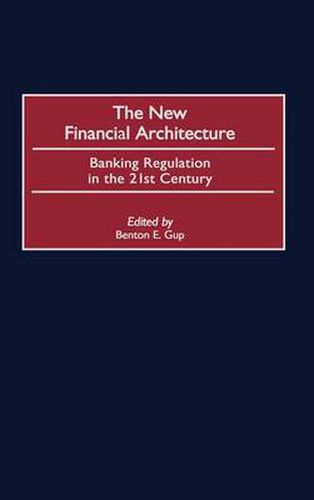Readings Newsletter
Become a Readings Member to make your shopping experience even easier.
Sign in or sign up for free!
You’re not far away from qualifying for FREE standard shipping within Australia
You’ve qualified for FREE standard shipping within Australia
The cart is loading…






Bank failures, crises, global banking, megamergers, changes in technology - the effect of these world events is to weaken existing methods of regulating bank safety and soundness, and even to make some methods ineffective. Federal regulators here and abroad, aware of the problems, are evaluating new ways to solve them. Dr. Gup and his panel of academics and regulatory professionals explore these problems and the difficulties in implementing solutions. They point out first that global banking, megamergers and changes in technology are drastically altering the way financial services are delivered. Second, existing methods of bank regulation, formulated in the United States and elsewhere as early as the 19th century, are not able to cope with them. And thus, third, the search now underway for new methods must be global in scope - inevitably they will involve cross-border supervision and international cooperation. Gup and his contributors cover a wide range of topics, from the rationale of banking regulation to optimal banking regulation in the new world environments. They also examine the innovative tools needed to cope with these problems, including greater reliance on market discipline; the use of internal controls based on statistical models, such as Value-at-Risk; and subordinated debt. Finally, there is the problem of drafting legislation in developing countries. The result: a timely, probing analysis of one of the hottest topics in bank regulation today, and an important resource for professionals and their academic colleagues in the fields of banking, finance, investment and world trade.
$9.00 standard shipping within Australia
FREE standard shipping within Australia for orders over $100.00
Express & International shipping calculated at checkout
Bank failures, crises, global banking, megamergers, changes in technology - the effect of these world events is to weaken existing methods of regulating bank safety and soundness, and even to make some methods ineffective. Federal regulators here and abroad, aware of the problems, are evaluating new ways to solve them. Dr. Gup and his panel of academics and regulatory professionals explore these problems and the difficulties in implementing solutions. They point out first that global banking, megamergers and changes in technology are drastically altering the way financial services are delivered. Second, existing methods of bank regulation, formulated in the United States and elsewhere as early as the 19th century, are not able to cope with them. And thus, third, the search now underway for new methods must be global in scope - inevitably they will involve cross-border supervision and international cooperation. Gup and his contributors cover a wide range of topics, from the rationale of banking regulation to optimal banking regulation in the new world environments. They also examine the innovative tools needed to cope with these problems, including greater reliance on market discipline; the use of internal controls based on statistical models, such as Value-at-Risk; and subordinated debt. Finally, there is the problem of drafting legislation in developing countries. The result: a timely, probing analysis of one of the hottest topics in bank regulation today, and an important resource for professionals and their academic colleagues in the fields of banking, finance, investment and world trade.